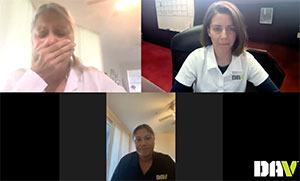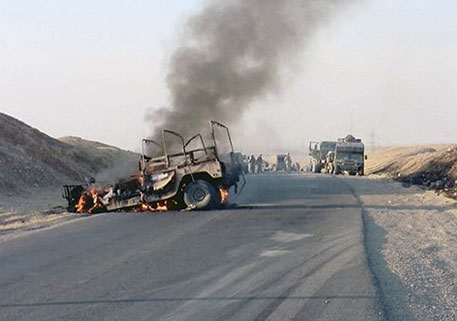
DAV helps military sexual trauma survivor get her earned benefits, validation
The first time Naomi Mathis saw Migdalia Griswold’s case file in 2019, she knew something was wrong.
Griswold, who served in the Army in the early 1980s, had extensive documented proof she was a survivor of military sexual trauma (MST). But instead of being helped by her command when she reported what happened, she was called a liar and eventually forced out of the service with an other than honorable discharge.
Mathis, a DAV benefits advocate, said the Department of Veterans Affairs initially allowed the character of her discharge from the Army to overshadow evidence proving Griswold was entitled to VA benefits. For more than 30 years, she was left to deal on her own with the post-traumatic stress disorder caused by the incident.
“It was just wrong,” said Mathis. “And that wrong needed to be right.”
Mathis, an Air Force veteran who has struggled with PTSD herself, said she immediately connected with Griswold the first time they spoke.
“I just got it,” said Mathis, who works out of the VA regional office in Bay Pines, Florida. “I understood everything she was saying. She was trying to get her emotions across to me. She didn’t need to, because I got it.”
Mathis, along with her supervisor, Michael Michelotti, began working with Griswold through a process that would take nearly two years to complete. They had to convince the VA to accept Griswold’s service as honorable so she could access the benefits she earned from service.
Mathis said that while it’s ultimately up to individuals, like Griswold, to work through the process—doing things like writing statements, attending appointments and gathering documentation—taking the first steps and knowing where to go in accessing VA benefits can be a confusing journey without someone to help.
“That’s where you need DAV to step in, because it’s so overwhelming,” said Mathis.
She said she views her role as a DAV benefits advocate like a coach doing work behind the scenes for her team—making sure players do what they need to do and know the plays so they are set up for success. People who come to Mathis and other DAV benefits advocates looking for guidance and help are met by someone who can relate to what a service-disabled veteran is going through and who has the expertise to navigate the process of getting earned veterans benefits, no matter how challenging the process may be.
In Griswold’s case, there were many challenges between trying to obtain original service records from the Army and getting approval for a VA exam. Mathis said she and Michelotti would check on Griswold’s file multiple times per week and had countless conversations with each other to figure out different approaches to get the VA to accept her service as honorable.
Mathis said the long, difficult process had kicked up everything that happened in the past for Griswold, causing her, at times, to want to give up and not think about it anymore.
“You need somebody to fight for you because, clearly, there’s no more fight left in you,” said Mathis. “Not at that point, there wasn’t.”
Mathis said she and Michelotti continued to work the case by themselves, with a breakthrough coming once they got the VA to agree to give Griswold an exam. It was that conversation with the treating doctor, coupled with statements from her and her family, and the original records from the MST incident in 1983 that finally convinced the VA to recognize her service as honorable.
In July, Mathis was able to share that news with Griswold over a video call—a moment she said still gives her goosebumps thinking about.
“Thank you so much,” Griswold said through tears of relief when Mathis shared the news. “I feel someone’s validating my story of what happened. I love you guys so much for all you have done for me.”
Mathis said the validation for Griswold and being able to share that she is now entitled to the full VA benefits she earned made the long hours and the challenges they faced worth it for her.
“I’m ready for the next one,” said Mathis, who calls Griswold her hero. “It gives you a boost.”
Griswold said she in now looking forward to being able to share her story with other women as a way to help others.
“I don’t call myself a victim anymore,” said Griswold. “I have learned how to say I’m a survivor.”





